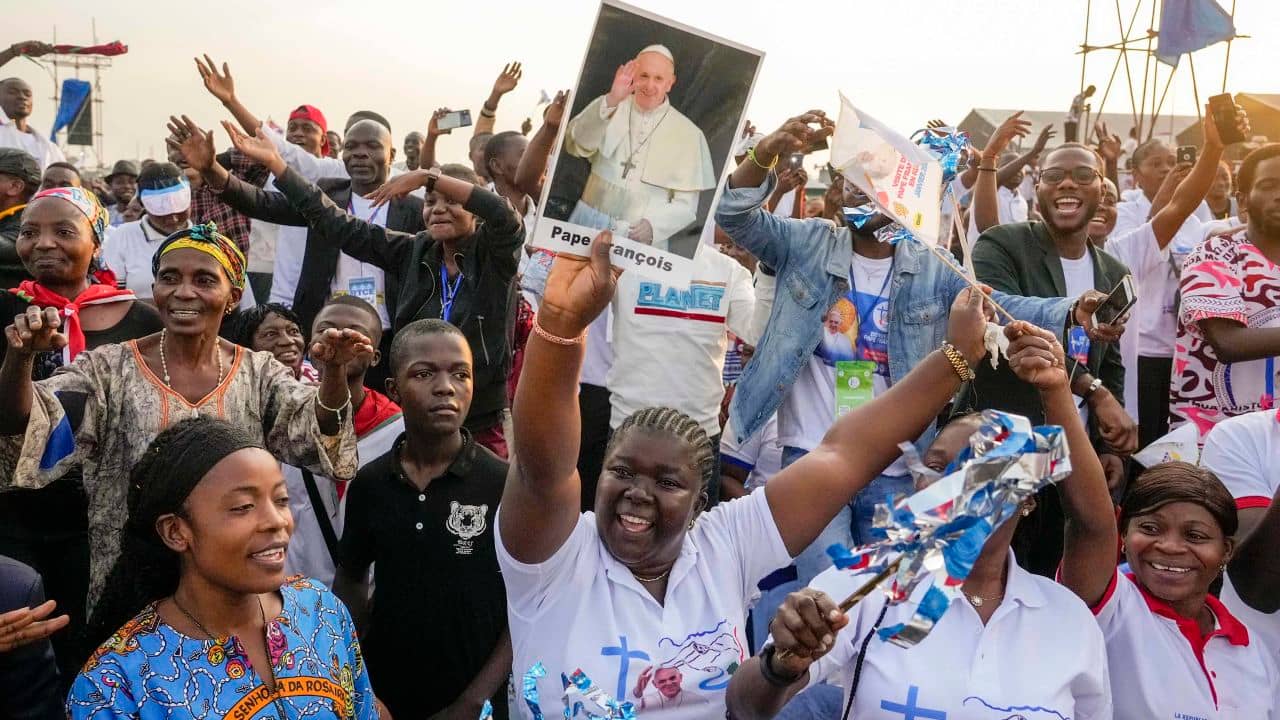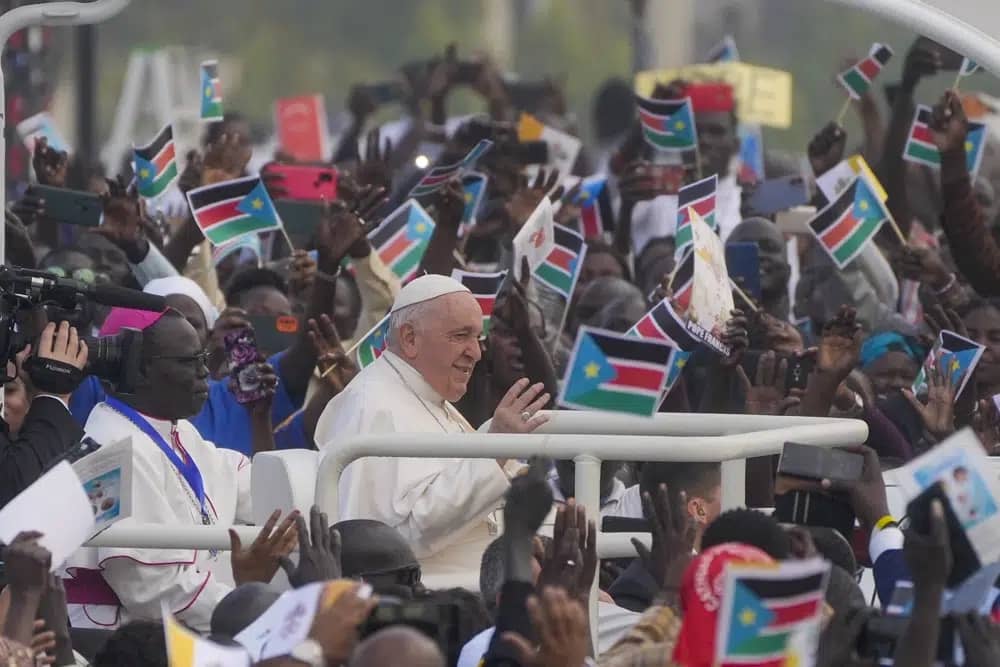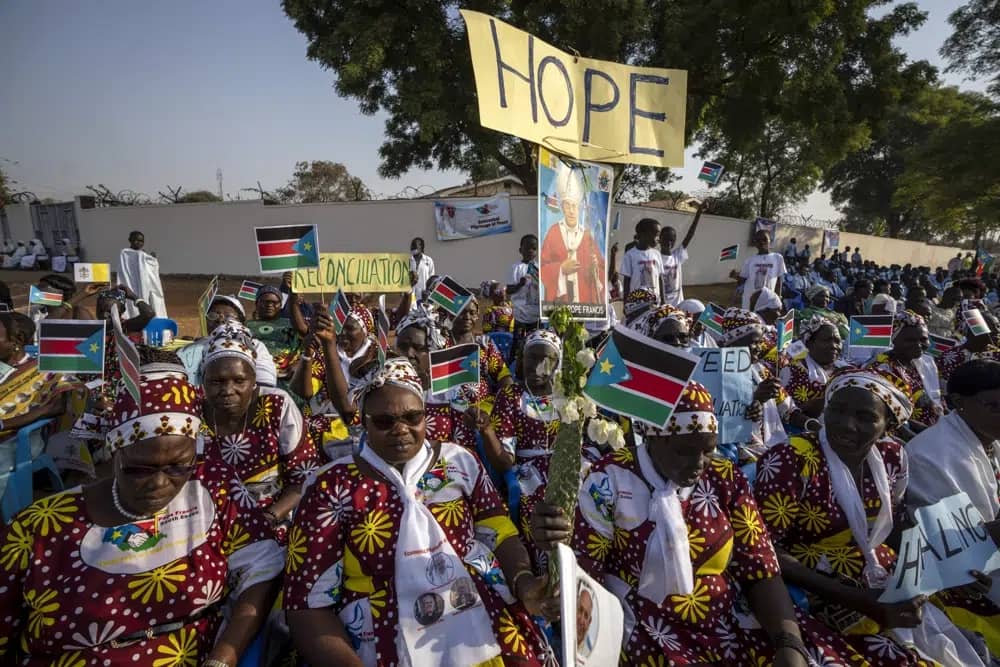A very happy pilgrim group in Juba today. 🎉🎉🚶🏿🙏🏿@LoretoRumbek, @Pontifex pic.twitter.com/0AG0JVz6dU
— Orla Treacy (@orlamtreacy) February 4, 2023
JUBA – In South Sudan, the cultural expectations for women are clear: They’re to get married young, have children, and stay at home to watch over and support their families, giving little thought to things such as an education and a career.
According to Sister Orla Treacy, an Irish missionary who has lived in South Sudan for nearly 20 years and who runs a secondary school for girls, roughly 10 percent of 15-year-old girls in the country are already married, and around 52 percent of 18-year-old girls are married.
The percentage of South Sudanese women who finish secondary school is “very low,” perhaps three to four percent, she said. Many girls even struggle to finish primary school before getting wrapped up in domestic duties, Treacy said, or buckle to pressure from their families to tie the knot.
However, increasingly, South Sudan women are pushing back.
Martha Malok Acingath, 18, is a graduate of the secondary school Treacy runs in Rumbek, and is eager to begin university classes in Kenya in another years’ time, with ambitions to pursue a degree in criminal law.
“The reason I decided to go to school was that I would see educated women mostly running things, and in my community, women don’t have a voice,” Acingath told Crux, saying women in her culture generally don’t enjoy the same rights as men, and are expected to “sit at home and be nannies to their babies.”
“But when I see around the world that women are doing things – they’re journalists, they’re lawyers, they are policeman – they are really neat and I also want to be part of it,” she said.
Acingath said her mothers and aunts never had the opportunity to go to school, whereas she is being raised in an era when it’s possible for women to receive an education, “and the support facilities like the Loreto mission, they educate, they empower girls to achieve more and to be the best of themselves. I’m privileged.”
The Loreto Mission school is overseen by Treacy, who is a member of the Institute of the Blessed Virgin Mary, also known as the Loreto Sisters, and serves as head of the Loreto Rumbek Mission in Maker Kuei, South Sudan, where she oversees a secondary boarding school for girls, a co-educational primary school and a women and children’s healthcare facility.
While currently only three to four percent of girls finish secondary school, when Treacy’s order arrived in 2006, founding the Loreto Mission and secondary school just two years later, in 2008, the situation was much worse, she said, saying they had just eight girls in their first graduating class, and 10 in their second.
At the time, there was just one secondary school in their country, and two overall in Lake State, where the mission is located, so the bishop who brought them over wanted another secondary school for girls established.
“For the life of me I couldn’t figure out where that vision came from, because when we arrived, everybody told us it was impossible, girls were not even going to primary school, let alone secondary school,” Treacy said, speaking to journalists.
“It was a very slow start,” but as of today, there are 10 secondary schools in their county, and for many, there is a waitlist of young women wanting to get in. At the Loreto Mission, there are now around 50-60 girls in each graduating class, with 70 in the class of 2023.
Treacy said she expects this number to double in the next three to four years, thanks in part to a new bill signed by the local governor pledging to protect girls and young women against early and forced marriages.
“That has changed everything for us,” she said, saying the Loreto Mission also offers a two-year internship program for the young women who graduate, and once that internship is completed, they are sent to university either in country, or in Kenya, with the financial support of the mission.
Yet in addition to the introduction of the bill, which signals a new step a changing cultural mentality, girls themselves are also increasingly interested in self-actualization, and are pushing back against family pressures to conform to current cultural norms.
Sarah Adut Makender Makech, 19, is one of the recent mission graduates, who is in her second year of the internship and is set to study dentistry at Nairobi University in Kenya.
One of 26 children, Makech, whose father has six wives, said she chose to attend the Loreto school because her family could not afford to send all of the children to school, but she had to resist pressure from her family.
Makech, who is also set to begin classes at the University of Nairobi in Kenya, said she is constantly told that if she goes to university, “she’ll just get arrogant, she won’t listen to the elders. It’s the right choice to get married and bring more cows into the family.”
However, she is determined to go, and says she has older sisters who have also gone to university, and is eager to join them.
Makech said she decided to study dentistry because there is only one dentist in their state, “and he’s grown old,” so she wants to step up and provide that service.
“In Loreto, there are a lot of things that are taught,” she said, saying that after graduating and beginning her internship phase, “I worked in the primary school, I had different experiences, I also worked in the clinic, and we also did different courses. We are taught life skills in Loreto, so it’s a good place to be.”
Treacy said they made the decision to send girls to university in Kenya because in South Sudan, there’s a sense that “we still need to build the foundation of quality education, and in order to build a quality foundation, we still need to export people to build up their standard and to come back in.”
“So, sending the girls out giving them exposure to young African women in other cultures – they go to Kenya and they see young African women driving cars, owning homes, running businesses. They can’t see that in South Sudan at the moment,” she said, saying the goal is for the young women they send to see these things, then “come home, and then they live it. That’s really the hope we have.”
Speaking to Crux, Acingath said she not only wants to be a lawyer, but “I want to fight for rights for women, I also want to inspire others so they can reach their potential.”
More and more parents are beginning to take their children, including young girls, to school, she said, saying the Loreto Mission has become a vital point of reference for education in the community.
“If you are given that opportunity to go to school, all I can say is make good use of it, because not everybody’s in school, not everybody gets access to a good school like Loreto mission,” she said.
Acingath said she also appreciates Pope Francis’s consistent advocacy for women – who are often victims of sexual violence and gender-based violence in South Sudan – and his many appeals on their behalf throughout his trip.
In a speech to internally displaced Saturday, the pope said women “are the key to transforming the country.”
“If they receive the proper opportunities, through their industriousness and their natural gift of protecting life, they will have the ability to change the face of South Sudan, to give it a peaceful and cohesive development,” he said.
Francis then asked that every South Sudanese citizen work to ensure “that women are protected, respected, valued and honored,” saying, “Please, protect, respect, appreciate and honor every woman, every girl, young woman, mother and grandmother. Otherwise, there will be no future.”
Calling Pope Francis’s visit to South Sudan “a blessing,” Acingath said she feels privileged to have seen him as early as 18, as her group was present outside of his Feb. 4 meeting with priests and religious in the country.
“His presence is more than his message. I cannot express my joy, but I am thrilled,” she said, saying his advocacy for women “breaks the barriers, because our culture has a big wall that women shouldn’t cross, a lot of boundaries, but he breaks the boundaries so we move free.”
Treacy, Acingath, and Makech were part of a group of around 70 people who made a nine-day “peace pilgrimage,” walking almost 200 miles from Rumbek to Juba for Pope Francis’s visit.
They were able to get a picture with Pope Francis after his meeting with the country’s bishops, priests, and religious Saturday, along with their own bishop from Rumbek, Carlo Carlassare, who was shot shortly after his appointment, but has recovered and has now taken the reigns in the diocese.
Follow Elise Ann Allen on Twitter: @eliseannallen
















